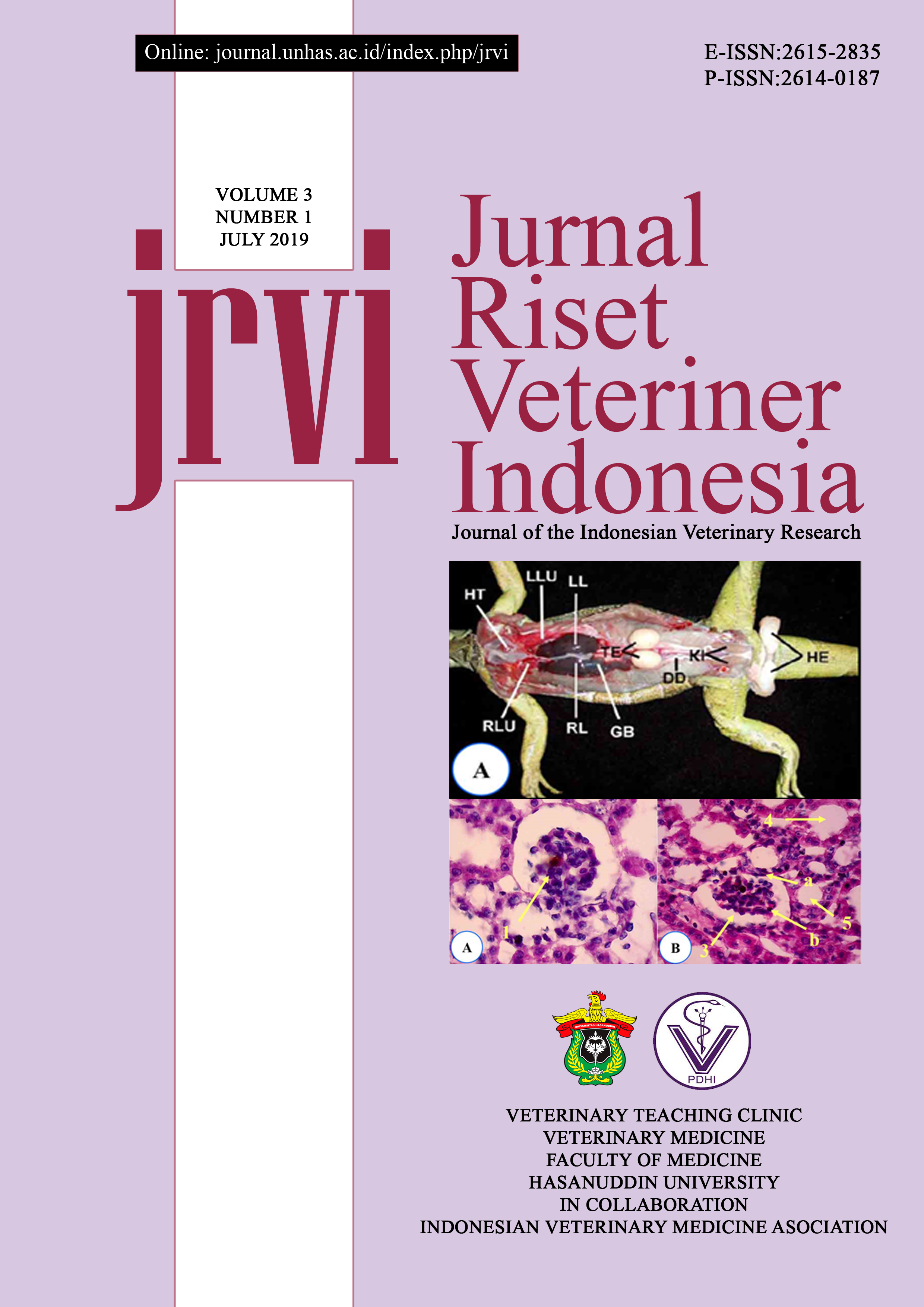Abstract
Dugong are endangered herbivorous marine mammals, which one of the causes of extinction is degradation of seagrass as main feed of the dugong to survive. Aim of this study was to measure the quality of seagrass of wild dugong in Lingayan island, Central Sulawesi. The results showed proximat analysis value of Halophyla minor, Halodule uninervis and Cymodocea rotundata as seagrass species respectively showed values crude protein of 6.86%, 7.69% and 8.79%, crude fiber of 10.77%, 18.36% and 24.26 %, crude fat of 0.99%, 1.81 and 1.5%, calcium of 0.79%, 2.12% and 1.89%, phosphorus of 0.34%, 0.34% and 0.26 and gross energy of 163.4 cal / kg, 300.5 cal / kg and 319.5 cal / kg. Cymodocea rotundata is the best feed for dugong because it contains high energy of 319.5 cal/kg and high protein 8.79%, if compared with Halophyla minor of 1622 cal/kg) and Halodule uninervis of 3014 cal/kg) furthermore Cymodocea rotundata has a fairly high crude fat content of 1.44% which will increase fat levels under the skin (subcutaneous ) dugong as insulators of changing environmental conditions. High concentrations of fiber in Cymodocea rotundata 25.26% can help retain water as long as food passes in the intestine. The levels of nutrients in Cymodocea rotundata which found in Lingayan island deserve highest nutritious feed of dugong.
References
Allen, JF., Lepes, MM., Budiarso, IT., Sumitro, Dr., Hammond, D. 1976. Some observations on the biology of the dugong (Dugong dugon) from the waters of south Sulawesi. J Aquat. Mamm. 4 (1) : 33-48
Anderson, PK. 1981 The behaviour of Dugong (Dugong dugon) in relation to conservation and management. Wildlife Research, 22(1) : 14-21
Anderson, PK., Birtles, A. 1978. Behaviour and Ecology of the Dugong, Dugong Dugon (Sirenia): Observations in Shoalwater and Cleveland Bays, Queensland. Wildlife Research. 5(1) : 1-23
Anggorodi, R. 1979. Ilmu makanan ternak umum. PT. Gramedia, Jakarta. Hal: 273-277.
Campbell, RSF., Ladds, PW. 1979. Diseases of the Dugong in North-Eastern Autralia: A prelimenary report. Proceeding of a Seminar/Workshop held at James Cook University. Page 8-13
Giri, SN. 2013. Quality and Efficiency of Dugong’s (Dugong dugon) Feed and also Syringodium isoetifolium Seagrass Abundance at Northern Lamaran Island, Bojonegara Waters, Serang, Banten.
Goto, MA,. Watanabe, S,. Karita, N,. Tokita, Y,. Yamamoto, Y,. Wakaki, S,. Asano, Y,. Oka., Furuta. 2008. Nutrient and energy consumption of captive mature dugong (Dugong dugon) consuming eelgrass at the Toba Aquarium. J Marine and Freshwater Behaviour and Physiology. 41 (3): 169-177
Iskandar, M., Sumitro., Sudranto, R., Hendrokusumo, S., Suprayogi A., Setijanto H., Darusman HS. 2006. Dugong in SeaWorld Indonesia. In. Proceeding of 1st International Asia Association Veterinary School (AAVS) Scientific Conference, July 2006, Jakarta, Indonesia
Lanyon, JM., Sneath, H L., Kirkwood, JM., Slade, RW. 2002. Establishing a mark-recapture program for dugongs in Moreton Bay, south-east Queensland. Australian Mammalogy. 24 (1) : 51-56
Lanyon, JM. 2003. Distribution and abundance of dugongs in Moreton Bay, Queensland, Australia. J Wildl Res. 30 (1) : 397–409
Linder, MC. 1992. Biokimia nutrisi dan metabolisme: Dengan pemakaian secara klinis. UIPress : Jakarta. Hal 781
Marlina, N., Askar, S. 2004. Komposisi kimia beberapa bahan limbah pertanian dan industri pengolahan hasil pertanian. Prosiding Temu Teknis Nasional Tenaga Fungsional Pertanian: Hal 99-103
Marsh, H. 2003. Aerial Surveys and the Potential Biological Removal Technique Indicate that the Torres Strait Dugong Fishery is Unsuistainable.
Marsh, H., Chanells, PW., Heinshon, GE., Morrisey, I. 1982. Analysis of Stomach Contents of Dugongs from Queensland. Aus. Wildl. Res. 9 (1) : 55-67
Marsh H. 1977. The alimentary canal of the Dugong. Australian Mam Soc Bull. 4 (32) : 36-45
Murray, RK., Granner, DK., Mayes, PA., Rodwell, VW. 2003. Biokimia harper. Ed. ke-25. Penerbit Buku Kedokteran EGC, Jakarta. Hal 401-408.
Nair, RV., Mohan, RSL. 1977. Studies on the vocalisation the sea cow Dugong dugon in captivity. Indian J Fish. 22 (1) : 277-278
Nishiwaski, M., Kasuya, T., Tobayama, T., Miyazaki, N., Kataoka, T. 1979. Distribution of the Dugong in the word. In. Proceeding of a Seminar/Workshop held at James Cook University 8-13 May 1979
Preen, A. 1993. Dugong : cultivation grazers of sea grass (Abstrak). Sirenews. 20 : 14 – 15
Reddy, LM., Dierauf, LA., Gulland, FMD. 2001. Marine mammals as sentinels of ocean health (2nd ed.). San Diego: Academic Press. Page 285-290
Roslinda, SS., Afdal, M. 2005. Potensi kualitas daun cabe-cabe (Asystasia gangetica) dan markisa hutan (Passiflora foetida L.) sebagai hijauan makanan ternak kambing lokal. J. Ilmiah Ilmu-Ilmu Peternakan. 8(1): 47-55
Sheppard, JK, Jones, RE., Lawler, IR. 2010. Dugong habitat use in relation to seagrass nutrients, tides, and diel cycles. Marine Mammal Science 26 (4): 855-879.
Sheppard, JK., Lawler, IR., Marsh, H. 2007.Seagrass as pasture for seacows:Landscape-level Dugong habitat evaluation. Estuarine, Costal and ShelfScience. 7 (1) : 117-132

